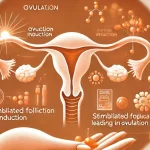Premature birth. Maybe you have heard stories or are already the parent of a premature baby. Anyway, it is a subject full of emotions, questions and uncertainties. That is why we have prepared this article for you: “All about Preterm birth: What you really need to know”. We will take you through the facts, risks and, above all, what you can do as a (future) parent to understand and handle this situation as best as possible. Sit down with a cup of tea or coffee and let's go through this important information together.
What is premature birth and why does it happen?
Premature birth happens when a baby is born before the 37th week of pregnancy. Although every pregnancy and birth is different, premature births often occur due to complex and diverse causes. These may include physical problems in the mother, such as infections or high blood pressure. Lifestyle factors also play a role, such as: smoking, stress, and inadequate prenatal care. Sometimes the exact reason for a premature birth is a mystery, even to medical professionals.
Some major causes of premature birth include:
-
- Medical complications, such as preeclampsia or... gestational diabetes
-
- Problems with the placenta
-
- Multiple births (twins, triplets, etc.)
-
- Infections in the uterus
-
- Lifestyle factors (smoking, alcohol consumption, etc.)
At Midwives Lelystad we understand how important it is to know and control these factors, which is why we offer comprehensive guidance to pregnant women. With proper care, many risks can be minimized.
Signs and symptoms of premature birth
At Midwives Lelystad we want you to have the signs and symptoms recognize premature birth so that you can act in time. Early intervention can be crucial for the health of both mother and child. Some important symptoms are:
-
- Regular or frequent contractions (contractions of the uterus) that do not go away.
-
- Low back pain that feels dull, constant, or rhythmic.
-
- Premature pressure in the pelvic area, as if the baby is pushing down.
-
- Sudden, intense abdominal cramps or severe menstrual-like pain.
-
- Changes in vaginal discharge, such as an increase in quantity or a change in color (for example, pink or brown).
-
- Loss of fluid, which can be a sign of ruptured membranes.
If you notice one or more of these signs, it is essential to contact your midwife quickly. People often think that rest solves everything, but that is not always the case. Here we have created a brief overview of the steps you can take:
| Symptom | Action |
|---|---|
| Frequency of contractions | Call the midwife immediately |
| Backache | Take a warm bath and rest |
| Pressure in the pelvis | Lie down and call the midwife |
| Changes in separation | Keep an eye on it and contact us if you have any doubts |
How to deal with a premature birth: Tips and advice
Experiencing a premature birth can be overwhelming, but there are several ways to cope. First, it is important to give yourself space to feel your emotions — crying, talking and, above all, resting. to take. This can help to reduce stress. In addition, it is advisable to build a strong support system. Talk to your partner, family and friends and don't be afraid to seek professional help, such as a counselor or midwife.
-
- Listen to your body and get enough rest.
-
- Provide good nutrition and hydration for recovery.
-
- Maintain daily skin-to-skin contact with your baby if possible.
Moreover, it is essential to stay well informed. Regular consultation with your midwife can provide a lot of support and clarity. They can guide you through the complexities of premature birth and provide you with crucial information about your baby's care. At the same time, you can consider joining parent peer groups to participate. Sharing experiences and tips with others going through the same thing can really make a difference.
| Aspect | Tip |
|---|---|
| Emotional support | Maintain a strong network of friends and family. |
| Power supply | Healthy meals and sufficient hydration. |
| Information | Consult your midwife regularly. |
Support and care for premature babies
When a baby is born prematurely, it requires special care and attention. These little ones often have a lower birth weight and their organs are not fully developed. This makes them more susceptible to complications and infections. It is crucial to set up a good support system, both in the hospital and at home. Premature babies are often treated in a neonatal intensive care unit (NICU) where specialized equipment and expert staff are available to monitor and care for them. Once home Parents can count on maternity care and can receive tips from lactation consultants for breastfeeding or the use of bottle feeding.
In addition to medical care, emotional support for parents of premature babies is also essential. Don't feel alone; talk to other parents in the same situation and seek support from family and friends. Here are a few things you can do:
-
- Eat healthy: Good nutrition helps with recovery and breastfeeding.
-
- Keep a diary: This can help track your baby's progress and organize thoughts.
-
- Stay informed: Read reliable sources and stay in touch with healthcare providers.
| Support | Description |
|---|---|
| Neonatology | Specific care for premature babies in NICU |
| Maternity care | Home care after discharge from hospital |
| Lactation experts | Advice for feeding premature babies |
| Parent groups | Support from other parents |
Experiences and stories from parents of premature babies
-
- Anxiety
-
- Expectation
-
- Relief
-
- Insecurity
-
- Endless Love
Such experiences are often shared in our support groups. Here parents will find the necessary support and receive practical advice from fellow sufferers. A handy one tip which is often mentioned is om small victories to celebrate, such as the first time skin-to-skin contact or the first feeding without a tube. This helps parents pay positive attention to progress, no matter how small, and supports the emotional health of both parents and baby.
| Experience | Frequency |
|---|---|
| Hold the first time | High |
| First feeding without aid | Average |
| Dip in oxygen level | Low |
Resume
Of course, what is the best way to end such an important topic? At Midwives Lelystad we understand that premature birth can be an emotional and confusing time. Our goal is to inform and reassure you as best as possible.
If you have any questions or need personal guidance after reading this article, please do not hesitate to contact us. We are always ready to support you.
Stay calm, trust your body and remember that we are here to help you, step by step. Together we ensure a good start for you and your little one!
Thanks for reading and hopefully we've helped you a bit further. See you soon!








